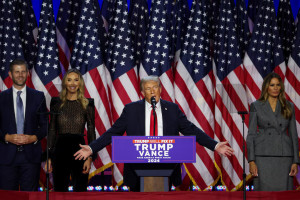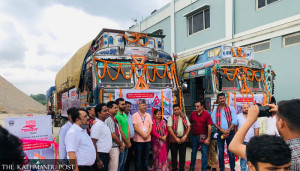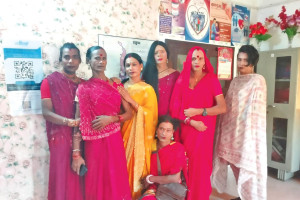Columns
Pitfalls of performative politics
All politics is performance, and any politician is only as good as his last act..jpg&w=900&height=601)
CK Lal
While celebrity editors, prominent columnists, by-lined reporters and opinionated columnists hog the limelight, the role of headline writers in the newsroom often remains unappreciated. It’s not easy to come up with a caption “… to interest, intrigue and give a real sense of the story to the widest possible audience—without being sensational".
André Gide called journalism “everything that will be less interesting tomorrow than today”. In producing the first draft of history on the run and creating literature in a hurry, journalistic stories have to present facts in the style of a fiction writer rather than that of an accountant, a lawyer or a researcher. The principle of answering “Who, What, When, Where, Why and How” is important, but so is their presentation. Desk editors often frown upon literary flourishes. But, the poetic licence in the headline adds the element of imagination to a factual story.
Poetry, said Ezra Pound, “is news that stays news”. Some headlines carry meanings as deep as the lines of a poem. The news header in the Nagarik Daily encapsulates an entire story with just two pithy adjectives.
The newspaper chose to use the Nepali word asantulit for the behaviour of Deputy Prime Minister and Home Minister Rabi Lamichhane and termed the response of the opposition party, Nepali Congress, as akroshit. The meaning of these words is deeper than what their translation in the English language—unbalanced and angry—manages to convey.
Spiritually speaking, a santulit abhibyakti has to be appropriate, balanced, civil, dignified, ethical, factual and gentle. It should aim to enhance harmony in society. Exceptions apart, DPM Lamichhane habitually does the exact opposite—asantulit—whenever he opens his mouth. Often translated as anger, akrosh is an expression of rage against real or perceived injustices.
For all his alleged foibles, lawmaker Gagan Thapa of the Nepali Congress is just performing his duty when he insists that public allegations against the DPM of the country need to be investigated by a parliamentary committee without unnecessary equivocation or false equivalence from the prime suspect. In the face of provocations, expressions of Thapa have been relatively santulit so far.
Communalists and communists share their disdain for values of rationality, restraint, reasonableness and responsible behaviour in public life. Communalists flaunt their jingoism, and communists wear partisanship on their sleeves. Political asantulan is inherent in the ruling alliance headed by Maoists, guided by the supremo of the Marxist-Leninists and composed of neo-politicos with fungible beliefs.
Power plays
The history of organised society begins with contestations among competing groups for the control of resources, primarily land. Battlefields decided winners, and everyone went with the victor. War was politics by other means for Clausewitz, while Foucault argues that politics is a continuation of war by other means. The centrality of a warrior is common to both formulations.
The Shahs are supposed to have won the chieftaincy of Gorkha in a dash for the ceremonial headgear. King Prithvi Narayan enlarged his domain through military campaigns. Court historians glorify the performance of their patrons as heroes and builders of the nation.
Appeased with bread and circuses, commoners had lost the ability or willingness to revolt as the crown passed from one sovereign to another through court intrigues and internecine warfare. Jang Bahadur established a dynasty through the combined power of his intuitive trickery and ruthless khukuri. Ostentation, pomp, shikar and show were essential elements of the Ranarchy.
The first Rana to pass the matriculation examination, Chandra Shamsher, had probably read Shakespeare in Calcutta. He may have used rhetorical skills of suggestive persuasion upon brothers Bhim and Khadga to engineer the murder of Ranodip Singh and the ouster of Dev to grab the crown of hereditary prime ministership and retain it for almost three decades.
The role of public opinion in influencing the legitimation of a ruler is the product of print culture that made it possible to disseminate propaganda and circulate counter-narratives simultaneously. Rather than authentic, the more persuasive version often prevailed. Popular leaders rose and fell due to the quality of their performance in theatrical plays, radio shows, city hall conversations and short films. The world became a stage in the theatrical sense of the term with the beginning of televised debates. Since the 1980s, the success or failure of a politician is at least partially attributable to on-screen performance.
There was a time when speechwriters played a crucial role in enhancing the image of a politician. They certainly retain their importance, but the profile of a wardrobe assistant and an appearance consultant has certainly increased manifold. The Indian Prime Minister Narendra Modi had an image of changing attires at least four times a day in his first term; on a campaign trail, he bettered his record by doing so in eight hours! Even when abroad, a performance artiste targets the domestic audience. There is a reason the Mayor of Kathmandu, Balendra Shah, decided to don a headgear with a pair of crossed khukuris on the red carpet at Cannes.
Professional politicos
Even though merely rhetorical, politicians once swore allegiance to some ideology and promised to change society according to their convictions when put on the seat of power through military coups, armed revolutions or democratic elections. Military generals have a smaller audience to convince—fellow officers and/or their foreign sponsors.
Revolutionaries need to attract a few fellow desperados with visions of greatness. In electoral politics, aspirants have to perform in salons to muster moneyed patrons and playact in public forums to mobilise the masses. With the premature declaration of the end of history, hardheaded realism is the only creed left standing in the political arena. All politics is performance, and any politician is only as good as his last act.
The scriptwriter of DPM Lamichhane’s preparation for entry into politics isn’t publicly known. It seems he was told early on that “politainment”—portmanteau composed of “politics” and “entertainment”—and ethnonationalism were going to be the two wheels of his ride through the fast lane into Singha Durbar. A portmanteau formed of “politics” and “entertainment”—politainment is analogous to infotainment and implies blending politics with entertainment.
Lamichhane began his re-entry into Nepal with a television programme pompously titled “Buddha was born in Nepal”, as if it needed his confirmation! His populist Sidha Kura was anything but straight: It pandered to the prejudices of the masses in the name of people. Ethnonationalism is perhaps the most powerful political anaesthesia; it transforms the target audience into zombies unable to see anything other than conspiracies and prevents them from taking responsibility for their inaction in the face of injustice. His programmes were more about soundbites than substance, but he managed to convince the voters of Chitwan to elect him twice.
The rush of ethnonational adrenaline generated in the wake of the 16-point conspiracy will slowly recede. Before ennui begins to frustrate the masses, the ruling class—or rather, the community of rulers—needs to invent another excuse to retain control. The 100 Rupee note with an amended map may not be enough to incite patriotic paroxysm, which is probably a good thing. On this Buddha Jayanti, prayers for good sense to prevail in the ruling community to ensure just peace for everyone in the country.




 19.12°C Kathmandu
19.12°C Kathmandu














